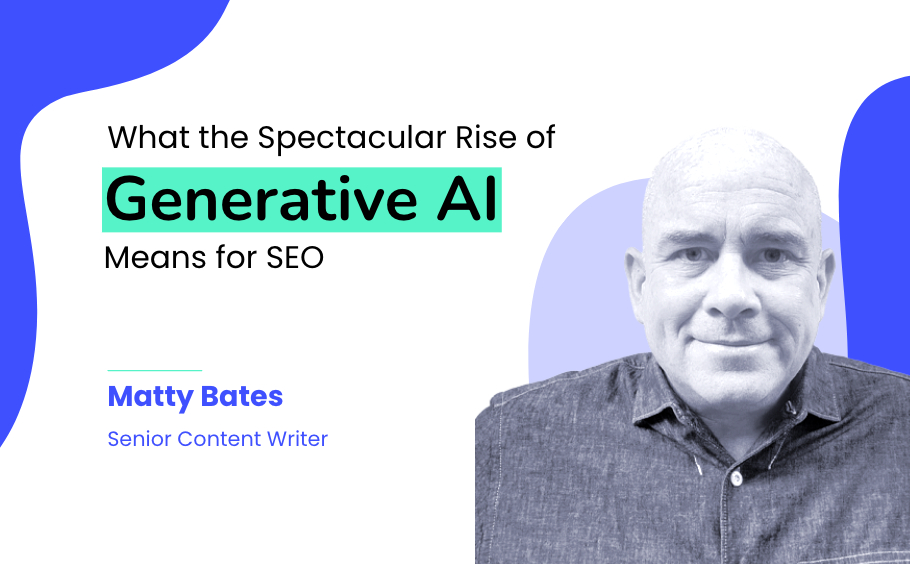An in-depth think-piece into the spectacular rise of generative AI tools like ChatGPT and what it means for SEO.
What the Spectacular Rise of Generative AI Means for SEO
Author: Matty Bates, Senior Content Writer

“Trust me, this is all a fuss about nothing. Everyone is getting way too carried away. This is just a gimmick.”
Those were my exact words when discussing ChatGPT with a copywriting friend recently, although my reasoning was influenced by general skepticism rather than diligent analysis. Prior to arriving at this casually dismissive opinion, I had tested the software once, for 60 seconds, while sitting at the traffic lights of a chaotic traffic intersection in Thailand.
The conditions may not have been perfect. I was using an android phone with a badly cracked screen, a rear cover held in place with sticky tape, and a right typing thumb hindered by a child’s Daffy Duck plaster after an incident chopping a disagreeable potato.
Midway through the test (or rather, after 30 seconds), as I clicked the ‘register with your Google account’ button, an infeasibly old hawker lady with a lone tooth and floppy hat began tapping the driver’s window, asking me if I wanted to buy a bottle of something or other. It looked like orange juice. Jolted by the sheer age of her and endeared by her toothy smile, I bought some.
The car behind me peeped impatiently and aggressively as the lights changed. By now a little stressed, I responded with an appropriate curse which the toothy smile lady assumed was directed at her. She walked away looking a little bemused at having been blessed with a sale before being immediately cursed, for no apparent reason.
I threw the phone on the passenger seat and drove away. Glancing down at my discarded phone, I muttered the words “it’s probably just a gimmick, anyway.”
Test complete, I guess.
Weeks later, shortly after Microsoft announced Bing as an imminent ChatGPT-fueled browser, as did Google with its own Bard offering, I was asked to write a blog post about generative AI. Setting my sights mainly on Chat GPT, I revisited the software from the comfort of my office desk on an actual laptop. Free of beeping cars, I jumped into it with the scrutiny it deserved. Now that I have, my opinion has shifted.
I was wrong; a gimmick it most certainly is not.
Game Changer?
ChatGPT is actually quite amazing, with or without a Daffy Duck plaster hindering your appraisal. The potential uses seem almost limitless, and its evolution over the coming years will be fascinating to observe. But one area in particular that will be affected – for better or for worse – is within the realm of SEO.
Now, we obviously have a boat-load of wonderfully talented, finger-on-the-pulse SEO experts here at SUSO, but as a content writer I thought it would be great to investigate and offer a layman’s perspective.
So, I have been exploring the good and bad of ChatGPT and what it means for the future of SEO. Bard and New Bing are both unlaunched to the wider public at time of writing, so the brief word count allocated to them both here is mostly speculative and based on various tweets, announcements, and blog posts put out by the two giants.
But first, what exactly is this new technology, why is it here, and what can it do?
Sneaking Out Of Nowhere
Released on November 30th, 2022, ChatGPT was seemingly yanked out of nonexistence without any considerable fanfare, feeling almost completely uninvited and without much warning, at least from a layman’s point of view. As a result, the initial reaction was something of a slow burn, outside of the general tech community, that is. It wasn’t until early January 2023 before the mainstream media latched onto it with gusto, and a social media narrative took flight.
Now that it has, the chatter is everywhere and almost inescapable, with various hives of activity on all forms of media and hundreds of opinion-based articles and niche-driven guides sprouting up daily. To that end, you are almost certainly aware of generative AI and what it does, but for anyone who has been living in a cave for the last couple of months, a brief delineation might be in order.
What Is ChatGPT, Exactly?
ChatGPT is an artificial intelligence-powered language model (or writing generator) created in 2015 by OpenAI and now jointly owned by Microsoft, thanks to a multibillion-dollar investment leading to a 49% stake in the company.
Through a complicated neural network in which the software ‘mimics’ neurological pathways of the brain, ChatGPT deploys deep learning techniques to provide human-like answers against an impossibly diverse range of questions, spitting out replies with an alarmingly confident delivery and a personal tone.
You could say it is a rather clever bot that gathers information on request from a huge databank of information scraped from websites, books, articles, studies, and more. Siri on steroids might be an oversimplification of the technology, as ChatGPT uses a form of artificial context, reasoning, and nuance, to formulate responses.
Contrary to popular belief, ChatGPT does not create all of the answers of its own volition or actual intelligence, nor does it search the internet for answers, at least not in real-time. The wealth of information within its boundless canyons of data banks has been previously imputed by programmers, with nothing pulled off the internet in response to prompts, questions, or instructions. As a result, some of the information might not be entirely accurate and should always be fact-checked. More on that later.
What Is ChatGPT Being Used For?
Fundamentally, ChatGPT answers questions in the same way that any other form of AI has been doing for years. Where to do this, and how to do that. The software becomes quite eyebrow-raising, however, when you ramp things up a little and test its ingenuity.
For example, you could type into the search field “why do we have leap years every four years,” and it will reply with a clear, succinct answer comprising a few clear sentences.
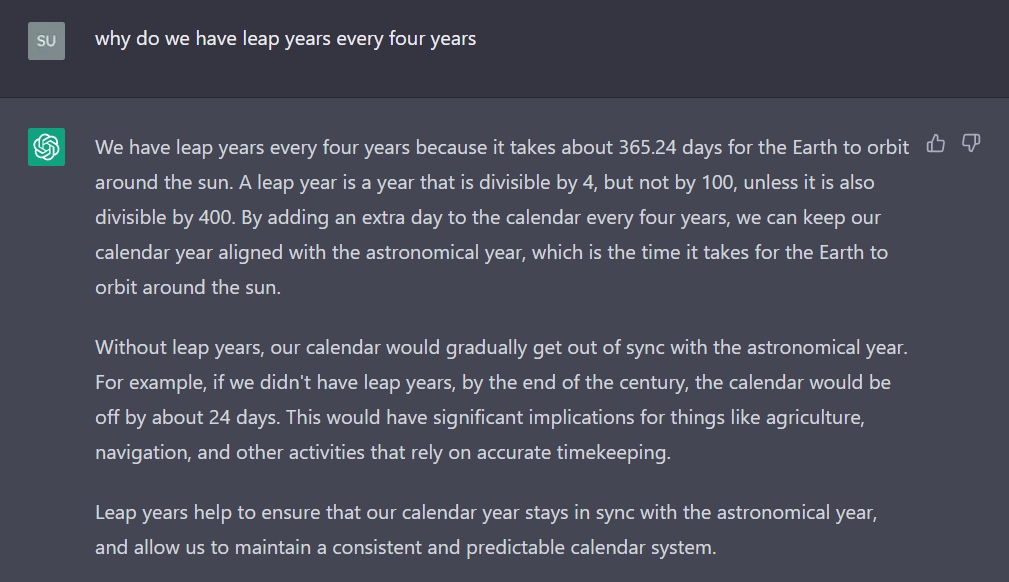
But if you push things a little further with the prompt “write a detailed article about leap years,” it will deliver a solid and well-structured article with the flow, wordplay, and general tone of voice of an actual person, (although ‘well-structured article’ is an entirely subjective analysis, depending on your expectations or standards).
You could then follow up with “now write the same article, but in a more engaging tone” or even “write me a funny poem about leap years,” and it will deliver on both.
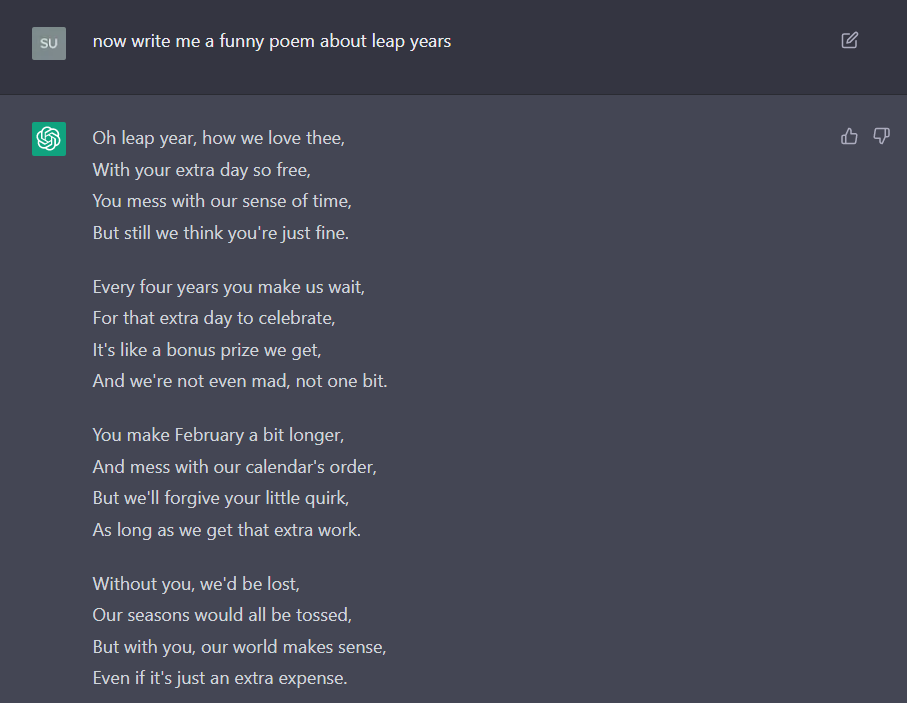
I even entered the prompt “write me an article about leap years from the perspective of a grumpy old man who hates the world,” and it immediately wrote 300 sarcastic and contemptuous words, ending with “And what do we get for all this trouble? An extra day. Wow, how exciting.” Whatever perspective you apply to the prompt, the software figures out a way to accommodate.
But it was just last week that I went from curious but distant observer to loyal fan, as I relaxed in my local pub after a tough week, fully immersed in a Manchester Utd Vs. Barcelona match. Eight minutes into the first half, my wife messaged me, asking if I would take her shopping.
Prompting Chat GPT with “my wife wants me to go shopping – write me a few intense paragraphs rejecting her invitation, in the style of a highly emotional Martin Luther King speech.” The end result was emphatic, emotional, and highly convincing, and as a result, I will be amazed if she ever asks me to go shopping ever again.
But the use cases are not limited to fun articles and game-saving MLK speeches, serving a whole range of practical applications from writing case studies and creating job application cover letters to writing and debugging actual code.
The explosive rise of ChatGPT is not without controversy, either. Twitter has been lighting up recently with school students boasting of lightning-fast completions of essays, while Redditors are sharing tips on how to use ChatGTP to pass online exams.
Rise & Shine, ‘New’ Bing
As a generative AI platform alone, ChatGPT is a remarkable creation that will almost certainly shake up online publishing to an as-of-yet unknown degree. Disruption within the SEO industry has been almost guaranteed, however, with the unification of ChatGPT and Bing, the much-maligned Microsoft search engine, which, up until now, accounted for approximately 8% of the search engine market.
Incidentally, if 8% sounds rather low, that is actually quite a generous allocation when considering that the most searched term on Bing is (you guessed it) ‘Google’, presumably as users of new MS laptops and desktops use the default Bing browser to find and install Chrome. With that in mind, the actual number is probably quite a bit lower than 8%. But I digress.
Bing, in other words, has gone largely unnoticed up to this point, with the vast majority of users – 85%, in fact – using Google as standard. The tech behemoth has been dominating search for 23 years, bringing in close to one-quarter of a trillion USD last year, $150 billion of which alone was courtesy of search ads.
It almost certainly looks like that is about to change, and Bing will finally start gnawing away at a bigger piece of the search pie. The industry has been shaken up, to say the least.
In hindsight, sleeping giant might be an accurate description for Microsoft’s historically unloved browser, as it awakes from slumber and looks to gain market share following its $10 billion investment in Chat GPT.
Rebranding less as a browser and more as an all-in-one assistant, Microsoft is asking you to look at New Bing as a “research assistant, personal planner, and creative planner, right by your side.” Using a ‘chatbox’ as opposed to a traditional search bar (or in conjunction with), New Bing will be able to access live data, in addition to Chat GPTs pre-2021 loaded data.
Bard Pushes Back
But with Microsoft’s announcement of ‘New Bing,’ Google has followed suit and shown its hand, probably a little earlier than they had originally planned.
Displaying an uncharacteristic lack of nerve, Google reacted to the Bing announcement by scrambling to reveal an also imminent AI search offering; Google Bard.
With a faltering start that wiped $10 billion off Google’s share price after an error during its first presentation (Bard answered incorrectly about the James Webb telescope), Google has legitimate reasons to be concerned.
To say this is the start of the ‘AI wars’ might be overdramatic but, well, there is no other conclusion to draw, really. Take one tech leviathan and pit it against another tech leviathan, one with a point to prove and 92% of ground to make up, and the other with a dominant market share to protect, then throw in a few hundred million dollars worth of marketing, PR, and R&D, at a time when a new AI tech is changing the face of search, and you pretty much have the perfect storm, in terms of an all-out AI war.
Make no mistake about it – a tickling competition this most certainly isn’t. Things are about to get very interesting in the world of search as all involved slog it out in the trenches.
SEO and Generative AI
But what does all of this mean for SEO?
At the moment, it is simply too early to say in any way that is even remotely useful. Bard and Bing are both in BETA, with access provided to only a handful of select users, leaving the SEO community to mostly speculate how this will affect search and SEO.
There is obviously potential for a greater number of zero-click searches, but to what degree, no one knows. More detailed search queries are quite likely, with users able to search in a more conversational manner.
One area that probably will improve is through more targeted traffic – providing your SEO is on point, that is. Users will soon be searching with highly specific terms relating to incredibly niche aspects of your content.
Content To Remain King
There is one area in particular that is causing quite a bit of debate and uncertainty in the SEO community, however. Can ChatGPT actually create SEO-formulated content or assist with bolstering your SEO through content creation? We will get to that, but first, what is Google’s take on generative AI?
Wrestle through the Google Search Essentials (previously known as Webmaster Guidelines), and you will unearth plenty of guidance relating to the use of AI. While you might assume that Google shows disdain for artificially generated content (based on previous penalisations for doing just that), their current stance belies this past approach. Or does it?
It’s difficult to say. Representing the Google Search Quality team in a recent post, Danny Sullivan offered the following:
“At Google, we’ve long believed in the power of AI to transform the ability to deliver helpful information. In this post, we’ll share more about how AI-generated content fits into our long-standing approach to show helpful content to people on Search.”
So far, so good, then. The post continues with more positive sentiment toward AI:
“Our focus on the quality of content, rather than how content is produced, is a useful guide that has helped us deliver reliable, high-quality results to users for years”
Those who are familiar with Google’s guidelines will know they sometimes appear slightly confusing (at best) or a little contradictory (at worst), a trait which is displayed later in that same post:
“Using automation—including AI—to generate content with the primary purpose of manipulating ranking in search results is a violation of our spam policies.”
Well, that’s not at all confusing, is it?
But actually, deciphering these seemingly contradictory messages isn’t too perplexing when taking a step back and viewing through a wider lens. Google’s mission statement, for example, informs us of the following:
“Google’s mission is to organize the world’s information and make it universally accessible and useful. That’s why Search makes it easy to discover a broad range of information from a wide variety of sources.”
Reading between the lines, the messaging is quite simple.
Google prioritizes good and helpful content over anything else, serving readers accurate, beneficial, and relevant information. Their focus is less on how the information is collated and more on how it serves the reader with useful and correct information.
The search engine’s stance on rewarding content that is written for humans, by humans is also expressed in its recent Helpful Content ranking system. Google condones the use of “extensive automation to produce content on many topics” – which refers to websites who are publishing articles or content that is purely generated by AI.
What About Content Creation?
But there is a problem, hinging on the key issue of accuracy. At this stage, the prerequisites of accurate, beneficial, and relevant information cannot be guaranteed through ChatGPT (or any other form of generative AI) without cautionary fact-checking.
In other words, the software is not entirely accurate at this stage. Whilst a fun article about leap years is pretty easy to nail, more complex subjects are prone to error and will almost certainly need checking and revising by a human. So it’s definitely still worth investing in content created by humans.
Again, it is difficult to say with any confidence whether AI can be used for SEO content creation free of penalisation. As things stand, it seems as though Google is figuring it out as they go. The official line isn’t exactly clear and calls for interpretation. For the time being, it is probably better to err on the side of caution and continue with good old reliable gray matter for the heart of your content creation.
What we can do, however, is use the technology as a framework or a jumping-off point for ideas and suggestions. AI is a very useful tool for suggesting article outlines, headers, meta descriptions, catchy article intros, and bullet points. You might consider using it to write entire articles and blog posts before fact-checking and making subtle changes here and there.
In terms of content creation, it might be better (at least, for now) to think of ChatGPT as the office junior dispatched to write up an article that will later be enhanced, polished, and improved by a senior writer before publishing.
That said, many website owners and content creators are indeed using ChatGPT for content creation, producing entire articles, social media posts, sales letters, landing pages, case studies, and even cold emails.
The problem is that the quality (again) is entirely subjective, depending on your requirements, standards, and expectations.
For example, by entering the prompt “write a cold email seeking an appointment with a software company to present my recruitment services,” Chat GPT will deliver a reasonably impressive appointment-seeking email to a standard that is, in my opinion, perfectly adequate.
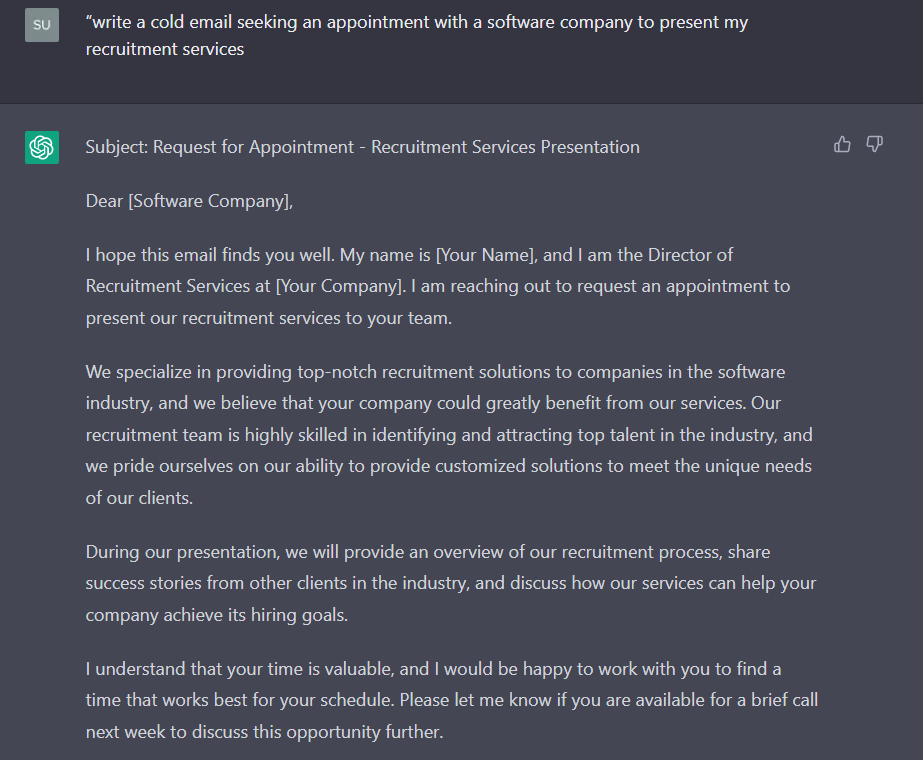
However, you could argue that ‘perfectly adequate’ is not a standard anyone should really be aspiring to, is it? Professional content and copywriters will employ strategy, psychology, fine nuance, and sometimes even subtle humor to compose that same email, with an end result far more likely to win over the recipient compared to ChatGPT’s rather formulaic, generic but perfectly adequate response.
Savvy content creators will take that “perfectly adequate” response and enhance it by employing subtle tweaks and adjustments to improve not just the quality but the feel of the words.
Or better still, don’t use it all. At least for content creation, that is. Stick to your guns, and write with your own voice. Throw in a few creative bullets. Take a few risks. In stark contrast to the inevitable forthcoming barrage of AI written content, there is an opportunity to stand out from the crowd and raise your content game by adopting a more edgy, punchy, and ultimately engaging approach to your content.
By adopting a more edgy approach, you might upset a tiny minority by occasionally dishing out something mildly inappropriate, but the greater good will be well served through content production that resonates.
I am not suggesting you affect a bull in a china shop writing style, but rather a forgiving pin prick. Get a little wilder. Stop conforming to ‘the standard’ and dare to be different. readers will appreciate you for that. Content should be a welcome distraction from the ho-hum grind of daily life, not part of it, after all. I am convinced that Chat GPTs rather vanilla approach to content creation is only going to add to mediocre ho-hum.
The problem is that Chat GPT just doesn’t know how to think outside of the box. Sure, it writes like a human, but it does not have the ability to think like one. I have been around humans all of my life. I am one, you will be pleased to know. I understand my fellow homo sapiens and have developed a feeling for which notes to hit and at which times.
Take my intro to this article, for example. I do live in Thailand – that part is true – but the whole “test at a busy intersection” thing didn’t happen. There was no hawker lady. No one beeped at me. I have never had an incident with a disagreeable potato, and if I had, I would have used an adult plaster to patch the wound and not a child’s Daffy Duck substitute.
I didn’t even watch the Manchester Vs. Barcelona game – and I can’t remember the last time I visited a pub in Thailand.
The whole thing was made up. The idea was to resonate, engage, and hook the reader through self-deprecating mild humor and satire, allowing the avatar to get a sense of who I am and connect with the article in a more personal way. Serious literary sharp-shooters might see that as amateurish, but it is a risk worth taking for the wider objective of resonation.
This is where generative AI falls short. In the same way that AI-generated art is quite impressive but seems almost hollow and free of soul, AI-generated articles lack the ability to resonate. It feels like a novelty right now, but trust me, we will all soon develop a sense for the tone of voice, structure, and cadence of AI. It will become obvious when a website is littered with ChatGPT-spawned content. We will develop a feel for it, and we might object.
ChatGPT does an excellent job of serving literal information with a conversational tone, but it lacks the ability to deliver it with real candor, feeling, and resonance. You don’t want your potential customers to read your articles, blog posts, and sales pages before thinking, “hmm, this feels like AI to me.” In time, that is exactly what will happen.
I don’t care how good AI gets at writing, we will all begin to sense when something is AI generated. Human written articles will become seen as niche, and more appreciated. Capitalize on this by building content that rebels against AI, and ultimately stands out from the crowd. AI simply does not have the flair to strut in the same way. AI would never think to write about a disagreeable potato, after all.
The same could be said for ChatGPT content creation across the board; the end result is entirely reasonable and will do just fine. Depending on your expectations, however, it can sometimes appear as lacking any creative punch, and those who are looking for heavily researched articles and posts might be disappointed at the frequent inaccuracies.
This speaks to a very important SEO pillar: the previously mentioned E-E-A-T. Relying on generative AI to deliver experience, expertise, authoritativeness, and trustworthiness would probably not be a prudent approach to your content endeavors, at this stage, without failing the E-E-A-T prerequisite.
To reiterate, a far safer approach is to use AI as a jumping-off point, but do not publish before fact-checking, adjusting, rewording, and generally polishing content yourself.
At this stage, all data should be strenuously fact-checked as the software does constantly produce inaccuracies and sometimes even completely false information. Just as the enthusiastic office junior might leap into an assigned article with unbridled enthusiasm and joy, ChatGPT will attempt to write something quite remarkable. In most cases, it will come close, but sometimes at the expense of accuracy. Infallible, it isn’t.
Leverage
The biggest SEO impact we can be sure of – at least for the time being until Bard and Bing are rolled out in full – relates to content creation.
The digital revolution has changed content creation massively. The internet is now rammed-full with content written in a hurry and without much care in order to satisfy SEO requirements and stuff articles with keywords. The situation has been compounded by agencies and content mills that have lower quality standards in terms of interesting and engaging content.
It is a harsh truth, and I take no pleasure in saying it, but standards have dropped, and everything seems so unremarkable these days. Publishers are hell-bent on conforming to a self-imposed code of sensible, stale, same same content while being completely risk-averse.
The golden age of boundary-pushing, highly creative content has long passed, with many articles, blog posts, and info guides lacking any real creative verve. This is the age of the listicle, after all. Gary Halbert would turn in his grave.
Generative AI will probably make the situation worse if we aren’t careful, as vast swathes of content writers use the software in abundance, essentially becoming editors in the process.
ChatGPT is an incredible tool for writing, and I am a fan. But it does have one major flaw (aside from inaccuracy) pertaining to similarity. As more and more writers use ChatGPT to produce content, the look and feel become the same, and in that sense, the technology leads to a consensus.
Let’s imagine that eventually, 75% of writers use ChatGPT to write content. Given the fact that most content is researched online, we can safely assume that with a sufficient period of time, the majority of content will be copying each other as ChatGPT progressively acquires content from the same pool. It becomes self-fulfilling and self-perpetuating. Fresh content written from a new perspective will become the minority.
Again, publishers can take advantage of this by shirking ChatGPT for content creation and engaging in a whole new content strategy born out of creativity, energy, and verve. Push the boundaries, and take a chance. Get edgy. Take risks. Do that, and you will stand out from the consensus and reap the benefits as a result.
As the great Dave Trott once said, when speaking about copywriting: “To be noticed, we need to do something different. To be different, we need to break the rules.”
We have an opportunity here to truly stand out above the crowd. If you think content is quite underwhelming now, just wait until ChatGPT becomes the writing default. Be smart, throw away the rule book, and make your own rules. It’s time to get more creative.
It’s all about that pin prick, people, so let’s get, uh, pricking.
Final Thoughts
Having said that, I think we should all embrace ChatGPT. Actually, I think most people are. Aside from the moral implications of AI, such as the whole issue of sentience and the potential for relinquishing power, in some far-fetched but very possible way, most people seem quite receptive to it. If we are being honest, the industry probably needed to shake up a little.
Despite my joyful rant about creativity, it truly is a remarkable technology and is the start of a whole new era. I applaud its rise. I am merely asking you not to get sucked in and rely on it for your content production, that’s all.
How exactly will it change search and SEO? Only time will tell. The technology hasn’t even rolled out yet, but I suspect when it does, the changes will be immense, and we will all learn to adapt. Many people seem to be fearing how this will impact SEO, but it could very easily benefit the industry hugely. So, let’s just embrace it.
Before it embraces us.
More articles
View more of our research.
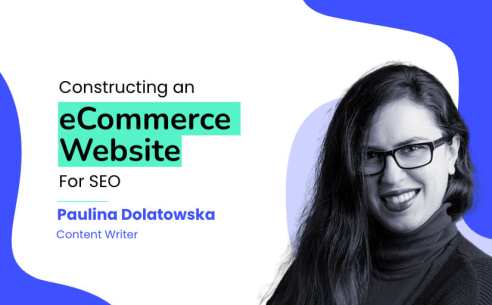
Constructing An eCommerce Website for SEO
Find out how to construct an eCommerce website that is great for users and accessible for search engines.
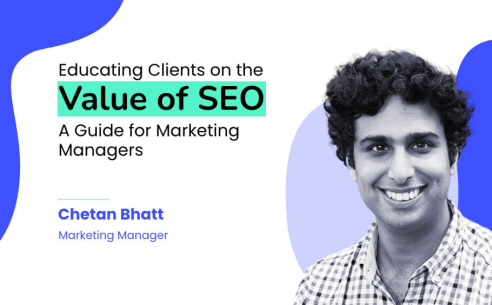
Educating Clients on the Value of SEO: A Guide for Marketing Managers
Find out how marketing professionals can transform their clients' perception of SEO by educating them about the value that it can bring to their businesses.
